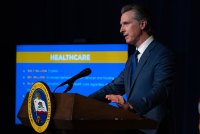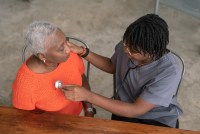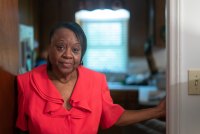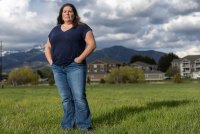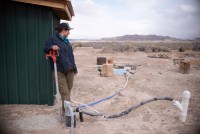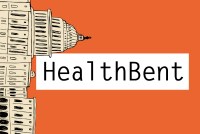Latest KFF Health News Stories
Readers and Tweeters Weigh Marijuana’s Merits Against Those of Alcohol or Opioids
KFF Health News gives readers a chance to comment on a recent batch of stories.
Los líderes demócratas dijeron que la táctica de Newsom de retener el dinero para el fondo general es una “estafa”.
¿Mamografías a los 40? Nueva pauta para la detección del cáncer de seno genera debate
Algunos médicos e investigadores que están interesados en un enfoque más individualizado para encontrar tumores problemáticos se muestran escépticos y plantean preguntas sobre los datos y el razonamiento detrás del cambio radical del Grupo de Trabajo de Servicios Preventivos de Estados Unidos
La enfermedad cardiovascular podría matar a más adultos mayores hispanos
El dramático envejecimiento de la población de Estados Unidos y el número creciente de personas con afecciones como hipertensión, diabetes y obesidad —que aumentan el riesgo cardíaco— se espera que contribuyan a este escenario alarmante.
California Governor and Democratic Lawmakers at Odds Over Billions in Health Care Funds
Gov. Gavin Newsom is getting pressure from his political allies to begin spending money on health care that the state raised by fining Californians who go without health insurance. But Newsom says the state can’t afford to.
Mammograms at 40? Breast Cancer Screening Guidelines Spark Fresh Debate
There is no direct evidence that screening women in their 40s will save lives, yet modeling suggests expanding routine mammography to include them might avert 1.3 deaths per 1,000. Highlighting the risk of false positives, some specialists call for a more personalized approach.
Many People Living in the ‘Diabetes Belt’ Are Plagued With Medical Debt
The “Diabetes Belt,” as defined by the Centers for Disease Control and Prevention, comprises 644 mostly Southern counties where diabetes rates are high. Of those counties, KFF Health News and NPR found, more than half also have high levels of medical debt.
Cardiovascular Disease Is Primed to Kill More Older Adults, Especially Blacks and Hispanics
Cardiovascular disease is the biggest killer of older Americans, with Black and Hispanic people at higher risk. Despite medical advances, researchers say, disparities are expected to worsen in the coming decades.
A Catch-22 for Clinics: State Bans Limit Abortion Counseling. Federal Title X Rules Require It.
Family planning clinics are getting caught between state abortion bans and a federal requirement to refer patients for abortion care on request.
Denials of Health Insurance Claims Are Rising — And Getting Weirder
The Department of Health and Human Services is tasked with monitoring denials both by Obamacare health plans and those offered through employers and insurers. As insurers’ denials become more common, they sometimes defy not just medical standards of care but sheer logic. Why hasn’t the agency fulfilled its assignment?
California Hospitals Seek a Broad Bailout, but They Don’t All Need It
As hospitals squeeze Democratic leaders in Sacramento for more money, health care finance experts and former state officials warn against falling for the industry’s fear tactics. They point to healthy profits and a recession-era financing scheme that allows rich hospitals to take tax money from poorer ones.
A Trans Teen No Longer Feels Welcome in Florida. So She Left.
Josie sensed Florida lawmakers were threatening her health care and ability to be herself at school. So she left. Families of other trans youth are plotting exits as well.
This Panel Will Decide Whose Medicine to Make Affordable. Its Choice Will Be Tricky.
Colorado’s new Prescription Drug Affordability Board could cap what health plans and consumers pay for certain medications starting next year. The process will pit patient groups against one another.
Refugios para víctimas de violencia doméstica dejan de esconderse
Por mucho tiempo, el estándar para este tipo de refugios, también llamados casas de acogida, ha sido alojar a las víctimas de violencia doméstica en casas ocultas con direcciones secretas
A medida que bajan los niveles de agua, suben los de arsénico
A medida que el oeste lucha contra una mega sequía que ha durado más de dos décadas y los estados corren el riesgo de recortes en el agua del menguante río Colorado, el Valle de San Luis ofrece pistas sobre lo que el futuro puede deparar.
As Water Levels Drop, the Risk of Arsenic Rises
As the West grapples with a megadrought, its driest spell in at least 1,200 years, rising levels of arsenic — a known carcinogen — in Colorado’s San Luis Valley offer clues to what the future may hold.
Domestic Violence Shelters Move Out of Hiding
A new domestic violence shelter in Bozeman, Montana, reflects efforts nationwide to rethink the model that keeps survivors of abuse in hiding. But there are no guidelines for bringing shelters out into the open, leaving each to make it up as they go.
Abortion Bans Are Driving Off Doctors and Closing Clinics, Putting Basic Health Care at Risk
Doctors say they are reluctant to practice in abortion-banned states, where making the best decision for a patient could run afoul of the law. Even former President Donald Trump’s surgeon general is concerned about the repercussions for women’s health, writes KFF Health News’ chief Washington correspondent, Julie Rovner.
Pequeñas comunidades rurales se han convertido en campos de batalla por el acceso al aborto
La búsqueda por promulgar prohibiciones locales se ha vuelto particularmente crítica en pueblos pequeños, situados en las fronteras entre estados que han restringido el aborto y estados donde las leyes preservan el acceso.
Se agrava la crisis del fentanilo en California
Impulsadas en gran medida por la prevalencia del fentanilo, un opioide sintético hasta 100 veces más potente que la morfina, las sobredosis de drogas en California matan ahora a más del doble de personas que los accidentes de tráfico.




